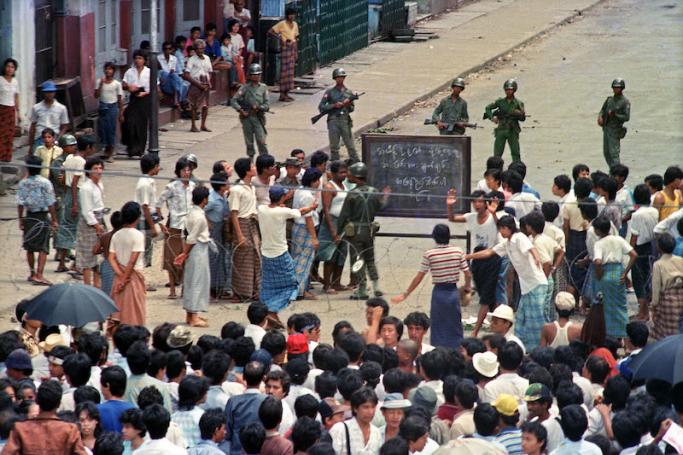Thirty-five years ago today, more than 3,000 people, including women, children and monks, were brutally killed by the Burmese military in their violent crackdown on peaceful protesters who were calling for the democratisation of Burma.
Today, people across Myanmar will remember the anniversary dubbed 8888, referring to the eighth day of the eighth month of 1988, cognizant that post-coup 2021 they are still fighting that fight against military rule.
The People Power Uprising of 1988 came after decades of military rule. Burma suffered insurgency problems and political conflicts since it regained independence from the British in 1948. The country’s fledgling democracy was threatened by civil war with ethnic minorities who demanded autonomy and federalism. Communist insurgents also demanded removal of parliamentary democracy.
In the February 1960 parliamentary election, U Nu became the prime minister of a parliamentary government. After two years, in 1962, Ne Win, the former prime minster of the caretaker government from 1958 to 1960, carried out a coup, and established the Revolutionary Council of the Union of Burma, which was mainly comprised of former military officers. His regime ruled the country under a socialist economic programme, effectively a repressive military dictatorship.
The downfall of his administration started when, under controversial economic reforms it declared overnight, in September 1987, that several high-denomination banknotes were no longer legal tender. This wiped out many people’s savings because their savings were in the worthless, high-denomination banknotes, which lead to widespread unrest in the following months. Hundreds of thousands of people conducted massive and countrywide general strikes on 8 August 1988. The uprising ended on 18 September in a bloody military coup after thousands of deaths.
However, the spirit of 8888 activists lives on today, on the 35th anniversary as once again the people are standing up against the 2021 coup-makers.
This time round, the opposition, under the title of the Spring Revolution, is pursuing an all-out civil war in an attempt to kick the military out of power.
While the 8888 uprising was short-lived, the Spring Revolution has legs, continuing for over two years after the coup with the National Unity Government (NUG) and other bodies calling for an end to the military junta – but more than that, calling for an “end to the system” on the pathway to a federal union.
The Myanmar junta is on the backfoot, reimposing its state of emergency, and going back to its old playbook of throwing out “scraps” – as seen with the “partial pardons” for Aung San Suu Kyi and former president Win Myint - in the futile hope that the Myanmar population will back down.
Today will be one more opportunity for the Myanmar people to use an anniversary to voice their opposition to the brutal military dictatorship.












